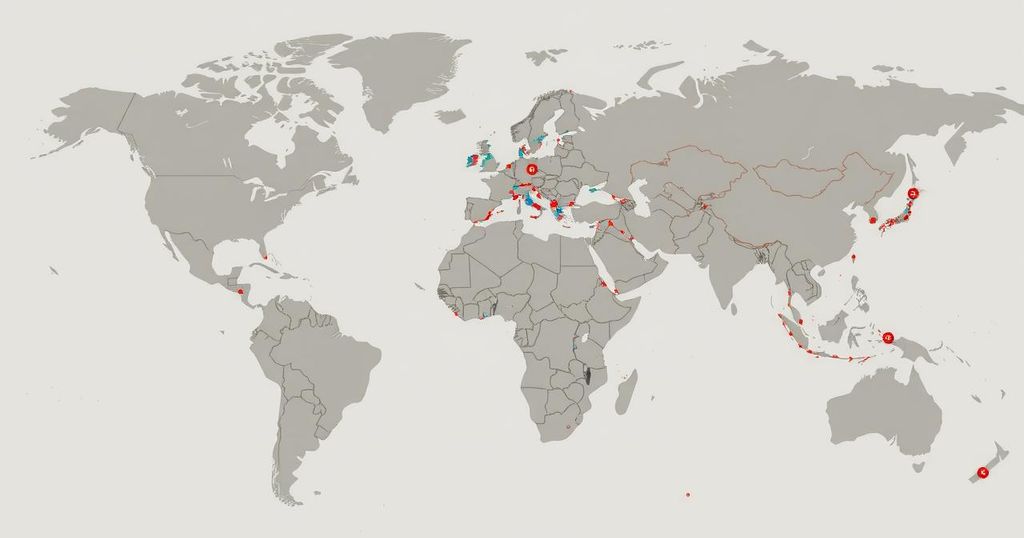The U.S. Department of State has included South Sudan on its highest-risk ‘Do Not Travel’ list due to escalating violence and crime, severely impacting the tourism sector. This designation follows similar advisories for Yemen, Venezuela, and other conflict-afflicted nations, threatening travel logistics and foreign investment in South Sudan. The overall tourism landscape faces significant challenges as regions become increasingly dangerous for potential visitors.
On March 10, 2025, the U.S. Department of State added South Sudan to its highest-risk “Do Not Travel” list, which already includes Yemen, Venezuela, Russia, Libya, Ukraine, the Central African Republic, and Haiti. This decision is driven by surging violence, armed conflict, crime, and kidnappings, effectively rendering South Sudan an impractical travel destination, further contracting the global tourism landscape. The implications for South Sudan’s fragile tourism sector are dire due to potential reductions in flight availability, unavailability of travel insurance, and declining foreign investment in hospitality.
This advisory is issued in the context of rising global instability, wherein numerous regions are disrupted by conflicts, kidnappings, and terrorism. While intended for public safety, such advisories have far-reaching consequences for the tourism industry, local economies, and broader travel trends. South Sudan has faced persistent political instability, ethnic violence, and governance challenges, with the U.S. ordering the departure of non-emergency personnel on March 8, 2025, emphasizing the deterioration of security conditions.
Issues such as violent crime—including carjackings, shootings, armed robberies, and kidnappings—are prevalent across South Sudan. Armed groups operate throughout the nation, and civilian access to weapons exacerbates risks of violent attacks. Foreign nationals, particularly journalists, encounter heightened dangers stemming from legal restrictions placed on reporting, resulting in harassment and fatalities for journalists covering the conflict. Consequently, the prospect of tourism recovery appears increasingly unattainable under the current advisory.
Tour operators specializing in adventure tourism and wildlife experiences are expected to face a dramatic decrease in bookings following this announcement. Airlines may opt to reduce or suspend flights to South Sudan, complicating travel logistics and further economically impacting tourism-related businesses. These enterprises, encompassing hotels, tour guides, and transportation services, will struggle for survival amid diminished operations and appeal.
The advisory’s implications extend to humanitarian workers, journalists, and business professionals, who are usually the main visitors to South Sudan. The new advisory raises the threat level for these groups, potentially prompting organizations to decrease or completely cease their operations in the country. Consequently, South Sudan becomes part of a larger cohort of countries facing stringent U.S. travel advisories, each grappling with unique but severe risks that hinder tourism and business activities.
Countries such as Yemen face severe dangers from terrorism and civil unrest, with the U.S. Embassy in Sana’a closed since 2015, and significant threats from groups like Al-Qaeda and ISIS. Venezuela similarly presents an unsafe environment marked by arbitrary detentions, high crime rates, and a closed U.S. Embassy since 2019. Russia’s escalating hostility towards U.S. citizens after its invasion of Ukraine, frequent detentions, and martial law further deter travel. Meanwhile, Libya’s instability, characterized by militias, kidnappings, and terrorism, effectively eradicates any significant tourism industry.
Ukraine continues to struggle under incessant missile attacks, while the Central African Republic is afflicted by armed conflict and political volatility, severely limiting U.S. Embassy support for travelers. Haiti’s rampant violence and political instability further worsen the travel landscape, as gangs target foreigners, illustrating the escalating security risks. Each of these nations reflects a broader trend of deteriorating global security, mirroring the inclusion of South Sudan on the U.S. “Do Not Travel” list.
In summary, South Sudan’s recent addition to the U.S. travel advisory alongside nations like Yemen, Venezuela, and Russia signifies a concerning trend in global security. The rise in conflicts, crime, and political instability is reshaping the tourism landscape, rendering numerous regions too perilous for travel. As the tourism industry contends with these realities, stakeholders must judiciously reassess their plans while affected nations strive for stability amid growing volatility.
In conclusion, the designation of South Sudan as a ‘Do Not Travel’ country by the U.S. signifies a broader decline in global security affecting tourism. The repercussions of this advisory reflect a larger trend where instability renders many regions unsafe for travelers. The tourism sector and related businesses face unprecedented challenges, necessitating a reassessment of strategies while countries work to address and reverse these adverse conditions.
Original Source: www.travelandtourworld.com




